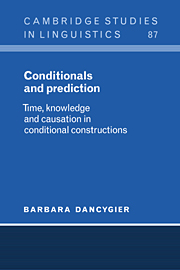Book contents
- Frontmatter
- Contents
- Acknowledgments
- 1 Conditionals as a category
- 2 Prediction and distance: time and modality in conditional clauses
- 3 Relations between the clauses in conditional constructions
- 4 Knowledge and conditional protases
- 5 Conditional clauses: form and order
- 6 If and other conditional conjunctions
- 7 Conclusion: prototypical conditionality and related constructions
- Bibliography
- Index of names
- Subject index
7 - Conclusion: prototypical conditionality and related constructions
Published online by Cambridge University Press: 22 September 2009
- Frontmatter
- Contents
- Acknowledgments
- 1 Conditionals as a category
- 2 Prediction and distance: time and modality in conditional clauses
- 3 Relations between the clauses in conditional constructions
- 4 Knowledge and conditional protases
- 5 Conditional clauses: form and order
- 6 If and other conditional conjunctions
- 7 Conclusion: prototypical conditionality and related constructions
- Bibliography
- Index of names
- Subject index
Summary
Predictiveness and a prototypical conditional
Recent typological work has expressed an understanding of linguistic categorial universals of cognitive structure. Researchers such as Kemmer (1988/1993) and Pederson (1991) have examined the way in which similar meaning categories are encoded again and again, in unrelated languages' “middle” and “reflexive” markers. Even more interestingly, not only are certain meanings cross-linguistically more likely to be encoded than others, but there seem to be a range of more or less closely related meanings which are likely to share a marker cross-linguistically. The same seems to be true of conditional constructions. When we identify a construction as “conditional” in some previously undescribed language, we do so on the basis of its meaning, and, I would claim, predictive conditional relations at the level of content are the meaning most likely to be identified as centrally “conditional” by most analysts. Yet we have an intuitive understanding that the expression of conditional relations in other domains may well share at least some aspects of formal expression with content-level prediction, in other languages as well as English.
Within English, evidence for the centrality of the predictive function to the definition of conditionality comes from several sources – beginning with the observation that native grammarians and teachers invariably light on these cases first. Most importantly, however, the expression of this kind of conditional meaning involves the tightest complex of entrenched, grammaticized constructional relation of form to meaning.
- Type
- Chapter
- Information
- Conditionals and PredictionTime, Knowledge and Causation in Conditional Constructions, pp. 184 - 196Publisher: Cambridge University PressPrint publication year: 1999



